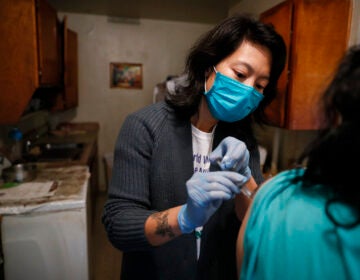Is President Trump causing toxic stress?
Is Donald Trump, with his daily Twitter harangues, impulsive and outrageous executive orders, and all-around nastiness harming the health of individuals?

Republican presidential candidate Donald Trump acknowledges photographers after speaking at a campaign rally in Baton Rouge, La., Thursday, Feb. 11, 2016. (AP Photo/Gerald Herbert)
“The presidency is supposed to age the president, not the public.” And with that, Jon Stewart, former host of “The Daily Show” and comic genius, touched on an overlooked but very serious public health question.
Is Donald Trump, with his daily Twitter harangues, impulsive and outrageous executive orders, and all-around nastiness harming the health of individuals?
Have people become more anxious, edgy, angry, and generally negative because of him? And, if so, at what point should we be concerned from a public health perspective?
Of course, no studies have yet been conducted on the public health ramifications of Trump’s behavior. Indeed, it would be difficult to isolate and study the broader, population effects of the president’s actions and control for other confounding variables such as actual policy changes. But it seems intuitively accurate to think that some subpopulation of the vast number of voters who were left horrified on Nov. 9 might now be experiencing a form of toxic stress. This stress is perpetually aggravated by the belligerent, unpredictable, and sometimes bizarre behavior of the president himself.
Toxic stress is caused by prolonged exposure to stressful situations — violence in the home, emotional abuse by a parent, unstable housing, or economic hardship will damage the brains of children and young adults. Adults in physically or verbally abusive relationships may also experience the ill effects of toxic stress. Toxic stress has horrible downstream effects. It causes a prolonged activation of our stress response systems — which include hormonal changes and increased metabolic rates — that significantly increase the risk for both serious physical and mental illness. Think of toxic stress as the psychological equivalent of breathing second-hand smoke everyday for months or years.
Since his election victory, President Trump has infused stress and uncertainty into virtually every facet of American life. From travel and immigration, to health care, to small businesses and investment markets, his erratic behavior leaves millions of people wondering what is next. At the same time he and his surrogates flatly deny saying and doing things that were actually recorded. Offering “alternative facts” blurs the line between reality and fantasy and is a common form of abuse sometimes called gaslighting.
There are data to suggest the president’s behavior is bad for our mental health. The Crisis Text Line, which offers rapid text-based support to individuals contemplating suicide, saw a dramatic spike in traffic the week after the election. Some campus mental health services have also experienced a significant increase in visits by distressed students with concerns directly related to the aftermath of the election and recent executive orders. And anecdotally therapists are reporting increased distress, anxiety, and depression from patients, family members, and colleagues about our new political reality. Massive protests are indicators of a general sense of anger, fear, and frustration.
Thanks to cabinet nominees who represent the undoing of the very institutions for which they’ve been selected to lead, huge numbers of Americans now worry about losing civil liberties, economic recession, the degradation of public education, environmental destruction, blurred boundaries between church and state, and nuclear war. President Trump has told people they cannot trust the media. Who, then, is our protection? Who can be trusted? Can anyone? Who is the enemy? Without trust, the socio-emotional world becomes a dangerous place; the natural outgrowth of which is a sense of paranoia.
People now fear that the America they know will not survive the Trump presidency.
We’re not at this point, but we should note that dictatorships are not good for the public’s health. In a 2007 study, British researchers examined the health of people in Turkmenistan, which was ruled for 21 years by autocrat Saparmurat Niyazov. Their results were chilling. They describe how the tactics of the totalitarian state — the suppression or fabrication of health data, gag orders that prevented doctors from diagnosing certain illnesses, widespread graft in the health care sector, and the dismantling of the health care system — all contributed to a health crisis there.
Some will, of course, object that “liberal snowflakes” are overly sensitive, weak, and need to accept reality, and that change is good. But such a response ignores the uniqueness of this moment in American history — where our president appears unstable even to his own aides — and compelling scientific evidence about abusive personalities and toxic stress.
The U.S. president, as with any wise leader, should be a stabilizing force and provide reliable ballast in an often chaotic and dangerous world. Instead, we find this president creating conditions that exacerbate feelings of profound disquiet and peril. As a result, it is quite possible that he is inflicting long-term serious psychosocial harm on millions of Americans.
Sadly, researchers now have an opportunity to conduct a natural experiment and examine the health effects of toxic stress emanating from an abusive U.S. president. Our hunch is their findings will be deeply disturbing.
—
Dominic Sisti, Ph.D., directs the Scattergood Program for Applied Ethics in Behavioral Health Care at the University of Pennsylvania, where he is also an assistant professor of medical ethics and health policy, psychiatry, and philosophy.
Cynthia Baum-Baicker, Ph.D., is board chair of the Scattergood Foundation for Behavioral Health and a clinical psychologist in practice in Philadelphia.
This essay originally appeared on ScatrergoodEthics.org. The Scattergood Foundation is a supporter of WHYY.
WHYY is your source for fact-based, in-depth journalism and information. As a nonprofit organization, we rely on financial support from readers like you. Please give today.




